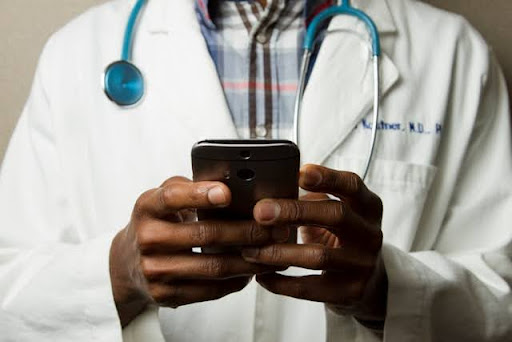
Have you ever heard of 0G? This term describes the first mobile phone, which debuted in 1973. The phone was hefty, weighing nearly 1.1 kilograms and having the size and shape of a small brick.
Fast forward almost 50-plus years later, and the transformation is remarkable. Today’s phones fit snugly in your hand and typically run on 5G technology.
This advanced mobile tech does far more than just make calls. It enables many mobile applications, allowing various industries to offer their services through mobile devices. The healthcare sector is no different.
Research shows that 74% of hospitals leveraging this technology for data collection are more efficient than those that don’t. Your facility can achieve this efficiency too! Keep reading to find out how.
What Is Mobile Health?
Mobile health, or mHealth, involves utilizing mobile devices in medical practice. Over the years, it has spurred the creation of innovative apps. These apps benefit both healthcare professionals and patients.
With advancing technology, patients are increasingly at ease with using apps, often incorporating them into their treatment plans. Many even depend on them for guidance regarding their condition or overall lifestyle.
Currently, over 400,000 healthcare apps are available. The rigorous process for verifying a medical app’s eligibility ensures that each one is safe and secure. Similarly, healthcare institutions should partner with the right developers to create effective and safe apps that improve patient care and management.
Mobile Devices: Transforming Healthcare
From the moment a patient enters your facility, you can utilize personalized apps to track their condition during their entire stay and even after they have been discharged. Below are some ways mobile devices are transforming healthcare:
Records Management
The quality of data input directly influences the accuracy of records. Unfortunately, many errors arise in patient medical records. Utilizing mobile devices in real time can significantly minimize these mistakes.
Tracking mechanisms are available to support this process, often eliminating the need for manual data entry as information can seamlessly transfer between platforms. DrChrono is an example of an all-round application that allows for charging, scheduling and patient records management.
Training and Literature
Your team can benefit from mobile devices to access medical literature and training resources such as:
- Medical research
- Textbooks
- Medical guidelines
- Updates and notifications
- Drug references
These guidelines can encompass your institution’s standard operating procedures (SOPs), ensuring that all staff members are aligned and have access to essential information and training. This is particularly advantageous for new employees.
For teaching hospitals, mobile devices can facilitate access to medical students’ training, allowing you to monitor their progress and evaluate the effectiveness of your training programs.
Successful students are likely to continue their practice at your facility, making the use of mobile devices for patient care a seamless transition for them.
Drug Prescriptions and Databases
Integrate your drug information databases with mobile devices for instant access to:
- Drug availability
- Retail pricing
- Drug interactions and side effects
- Dosing requirements
Stay updated effortlessly, making medication prescribing more efficient. Once a prescription is entered, you and your staff can access it easily, providing a comprehensive list of a patient’s medications and dosages. It can also track drug and food intolerances, minimizing transcription errors.
Benefits of Healthcare Mobile Apps
- Virtual Consultations for Enhanced Convenience: Medical applications have transformed patient convenience, removing the need for extensive travel. Virtual physician meetings can now seamlessly occur from the comfort of home, providing immediate and timely guidance to prevent health issues from worsening.
- Continuous Health Monitoring: Ongoing surveillance is crucial considering that over half of the US population has at least one chronic ailment. Mobile applications support integrated care by enabling healthcare professionals to monitor patients’ vital signs and manage chronic conditions efficiently.
- Healthcare Reach Beyond Limits: For individuals in remote areas with limited hospital access, healthcare apps are invaluable. These apps allow prompt virtual consultations and health tracking, ensuring healthcare is accessible to everyone, regardless of location.
- Easy Appointment Scheduling: Medical apps have simplified the previously arduous task of phoning clinics for appointments. Patients can easily check doctor availability and clinic hours and schedule appointments at their convenience, eradicating long wait times and enriching the patient journey.
- Streamlined Health Record Management: The challenge of handling physical medical files is replaced by the efficacy of healthcare apps. Digital Electronic Health Record (EHR) solutions empower patients to manage their health data, offering easy control and sharing options with healthcare providers. This secure digital repository guarantees enhanced accessibility, with automatic updates reflecting recent findings and diagnoses.
Challenges and Considerations
Smart healthcare apps offer great potential, but they face challenges that require attention:
- Privacy and Security. Safeguarding patient data is crucial. Apps must follow strict privacy and security measures to protect sensitive health information.
- Access and Equity. Not everyone can access smartphones or has the digital skills to use these apps. Ensuring fair access to connected health technology is vital to prevent widening healthcare gaps.
- Regulatory Compliance. Smart healthcare apps need to meet healthcare regulations to ensure quality and safety standards.
- Integration with Healthcare Systems. Seamless integration of these apps into current healthcare systems is necessary for a smooth doctor-patient interaction. Ensuring compatibility with electronic health records and other healthcare platforms is essential.
Endnote
Connected health is introducing a fresh phase of patient-focused care. Smart healthcare applications are revolutionizing the doctor-patient dynamic by boosting patient involvement, granting healthcare information access, and facilitating remote monitoring as well as telemedicine.
These apps could enhance healthcare results, simplify communication, and establish a customized treatment approach. Yet, it’s vital to tackle privacy, access, and regulatory compliance challenges to guarantee universal access to the advantages of smart healthcare applications.
